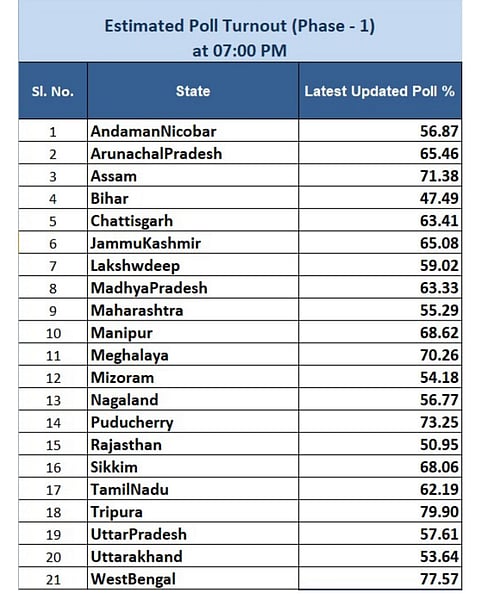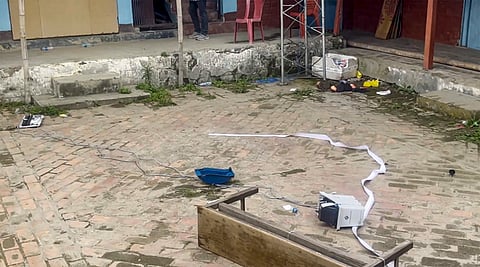The first phase of Lok Sabha Elections 2024 which began today, covering 102 constituencies across 21 states and Union Territories (UTs), ended with a voter turnout of 60 per cent.
Lok Sabha Phase 1: Voter Turnout, West Bengal Clashes, Manipur Gunfire | All Details
Violence was reported in some parts of West Bengal and Manipur in the first phase of Lok Sabha elections and the voter turnout fell from the figure in the 2019 Lok Sabha polls. Here's a recap of events throughout the day.
About 969 million people are eligible to vote in the biggest election in human history, with polling taking place in seven phases over the next six weeks. The subsequent phases of the general elections are scheduled for April 26, May 7, May 13, May 20, May 25, and June 1, respectively. The counting of votes will take place on June 4.
Violence was reported in some parts of West Bengal and Manipur in the first phase of elections and the voter turnout fell from the figure in the 2019 Lok Sabha polls — here's a recap of events throughout the day.
Voter Turnout:
Across 21 States/UTs, the tentative voter turnout as of 7 PM is over 60 per cent, according to the latest data by the Election Commission of India.
The figure fell from the first phase of polling in the 2019 Lok Sabha polls, when a voter turnout of 69.43 per cent was recorded.
Tripura has the highest turnout at 79.9 per cent.
Bihar recorded the lowest turnout at 47.49 per cent.

Assembly polls: Arunachal Pradesh and Sikkim held elections for both Lok Sabha and state assemblies simultaneously during the first phase. Arunachal Pradesh saw a voter turnout of 67.95 per cent, while Sikkim recorded 65.85 per cent for the assembly elections.
Polling for 60 assembly seats in Arunachal Pradesh and 32 seats in Sikkim took place from 7 am to 5 pm on Friday.
How Many Seats Are Covered In First Phase Polling Across India?
Polling in the first phase covered all seats in Tamil Nadu (39), Uttarakhand (5), Arunachal Pradesh (2), Meghalaya (2), Andaman and Nicobar Islands (1), Mizoram (1), Nagaland (1), Puducherry (1), Sikkim (1), and Lakshadweep (1).
Additionally, voting took place for 12 seats in Rajasthan, 8 seats in Uttar Pradesh, 6 seats in Madhya Pradesh, 5 seats each in Assam and Maharashtra, 4 seats in Bihar, 3 seats in West Bengal, 2 seats in Manipur, and 1 seat each in Tripura, Jammu and Kashmir, and Chhattisgarh.
Also Read:
Violence In West Bengal; TMC, BJP Clash
The first phase of Lok Sabha polls in West Bengal saw intermittent violence, notably in the Cooch Behar constituency. Incidents included clashes between workers of the Trinamool Congress (TMC) and the Bharatiya Janata Party (BJP).
TMC supporters were accused of stone pelting in Chandamari, resulting in an injury to a BJP booth president, while BJP workers were accused of assaulting TMC workers in the Sitalkuchi and Chotosalbari Gram Panchayat areas.
Also Read | India's Tryst With Ideology
According to reports, both the TMC and the BJP filed numerous complaints, totalling 80 and 39 respectively, regarding poll-related violence, voter intimidation, and assaults on poll agents.
Gunfire, EVMs Destroyed In Manipur

Several incidents disrupted the electoral process in Manipur, including vandalism, armed individuals threatening voters, destruction of electronic voting machines (EVMs), allegations of proxy voting by an armed group, and a reported firing incident.
Four people were injured in the firing.
Voting stopped due to allegations of proxy voting at Khaidem Upper Primary School polling booth under Konthoujam assembly constituency in Imphal West.
Almost 0% Voting In 6 Nagaland Districts
By Friday afternoon, almost zero voting was reported across six districts in Nagaland. This low turnout followed a declaration of 'public emergency' by the Eastern Nagaland People's Organisation (ENPO), urging locals to boycott the election as they demand a separate administration with greater financial autonomy.
The ENPO also gave an abstention call before last year's Assembly election, but this was withdrawn after an assurance from Union Home Minister Amit Shah.
Nagaland has one Lok Sabha seat, which has been held by the Nationalist Democratic Progressive Party's Tokheho Yepthomi since a 2018 bypoll. The NDPP is an ally of the BJP.
